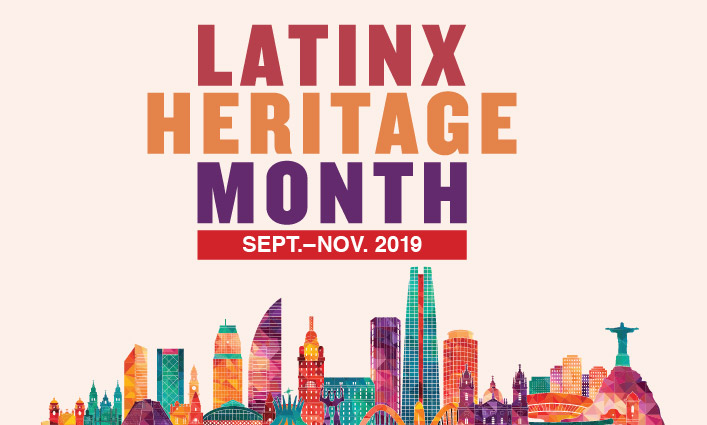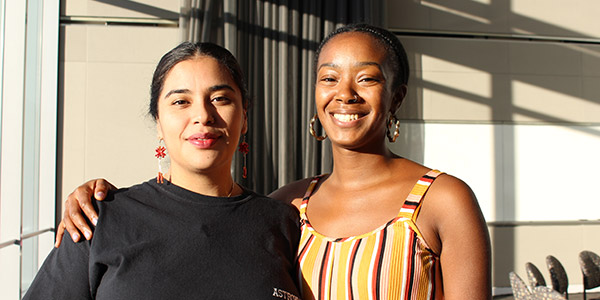
At John Jay College we know that diversity is one of our greatest strengths, and a vital aspect of that diversity is rooted in our Latinx students, faculty, staff, alumni, and supporters. That’s why it’s important for our entire community to come together to celebrate Latinx Heritage Month.
Networking Reception
On September 16, President Karol V. Mason helped begin our Latinx Heritage Month activities by welcoming our community to a Networking Reception sponsored by the Latinx Heritage Month Committee and the Student Activities Association. Students, faculty, and staff nibbled on snacks while getting to know each other. Mason set the tone by starting off the event with a warm welcome in Spanish. “¡Bienvenidos al inicio oficial de nuestra celebración del Mes de la Herencia Latinx aquí en John Jay College!” said Mason, receiving an appreciative round of applause. “I’m excited to kick off a series of events all designed to acknowledge and celebrate the many achievements and vital contributions from our Latinx community. I always say that John Jay is a Hispanic-Serving Institution because our students chose to make it one.” Mason went on to say that John Jay’s undergraduate student body is 46 percent Latinx, and that our freshman class is 50 percent Latinx. She also thanked the many Latinx faculty and staff members that help guide and encourage our students throughout their academic journeys.

“¡Bienvenidos al inicio oficial de nuestra celebración del Mes de la Herencia Latinx aquí en John Jay College!” —Karol V. Mason
Mason also addressed the recent racially motivated acts of violence against the Latinx community—namely the terrorist attack in El Paso, Texas. She told the audience that as a community focused on issues of justice, it was paramount that we stand in solidarity with the Latinx community. “It’s essential for us to call out the false and hurtful characterizations of Latinx folks and immigrants that directly contribute to these intolerable forms of discrimination and hate,” said Mason. “We are working hard to make sure that all of our students at John Jay—regardless of their status—feel safe and supported throughout their academic journey.”
She closed her address with an invitation for everyone to participate in the Latinx Heritage Month Events. “Because the more we learn about each other, the more we value our shared humanity,” said Mason.
Watch President Karol V. Mason’s Latinx Heritage Month Welcome Address
White Supremacy and Its Impact on Immigrant Communities
As President Mason pointed out, the Latinx community has had to face acts of discrimination and hate, both historically and currently. “Students are witnessing this violence and experiencing pain and anxiety about it. They’re worried that it may be their community next,” said Cynthia Carvajal, Manager of the Immigrant Student Success Center, noting that students are leading the effort to have these tough conversations. “Students reached out because they wanted to talk about white supremacy and its impact on immigrant communities. It’s an important conversation to have.” To help our community express what they’re feeling—and to unpack some of the societal factors surrounding these racially motivated acts of violence—on September 17, John Jay held a two-hour session, sponsored by the Immigrant Student Success Center and Resistance Education, called: White Supremacy and Its Impact on Immigrant Communities.
“It’s always important to have these discussions because people are dying. I’m directly affected by it, and people who are a part of my immigrant community are all directly affected by it,” said presenter Angelica Lara. “I think that it’s important to realize that there is a designer and it is strategic when these things happen. It’s important to realize that there’s a lot of work that’s been done before, in order for this to become a problem in the United States in the first place; there’s a history. Now we’re getting to the place where we’re trying to create a pushback to it.”

“It’s important to realize that there’s a lot of work that’s been done before, in order for this to become a problem in the United States in the first place; there’s a history.” —Angelica Lara
The session started off with the presenters detailing the history of white supremacy to the group. Then, to get the group interacting, the presenters read a definition of white supremacy, and they asked the group to choose the words that struck them the most in the definition. Words like “dominate,” “belief,” and “superior” came up, allowing group members to discuss their thoughts and personal experiences.
Afterwards the group played a game where each member received two cards: the one that they couldn’t see on their forehead represented how people perceived them, and one that they saw and kept in their pocket represented how they felt about themselves. After interacting with each other, and lining up in the order of how they felt they were treated, members of the group unpacked feelings about perception, and discussed how a person feels on the inside isn’t necessarily reflected on the outside.
“Remember: white supremacy is not a shark; it’s the water.”
The most moving part of the session came when the presenters let the members of the group speak freely. Students expressed how they felt about the terrorist attack in El Paso, Texas. They voiced outrage and sadness, and they communicated an overwhelming feeling to take action. Faculty and staff members expressed a deep concern for their students, and the country, and they explained how those feelings were connected to a profound desire to see more diversity within John Jay’s faculty and staff. A member of the group, who was not a person of color, expressed how important it was for an ally to listen more than they spoke. And, the evening ended with one group member reciting a lyric about white supremacy. “Remember: white supremacy is not a shark; it’s the water.”
View the full list of Latinx Heritage Month Events



